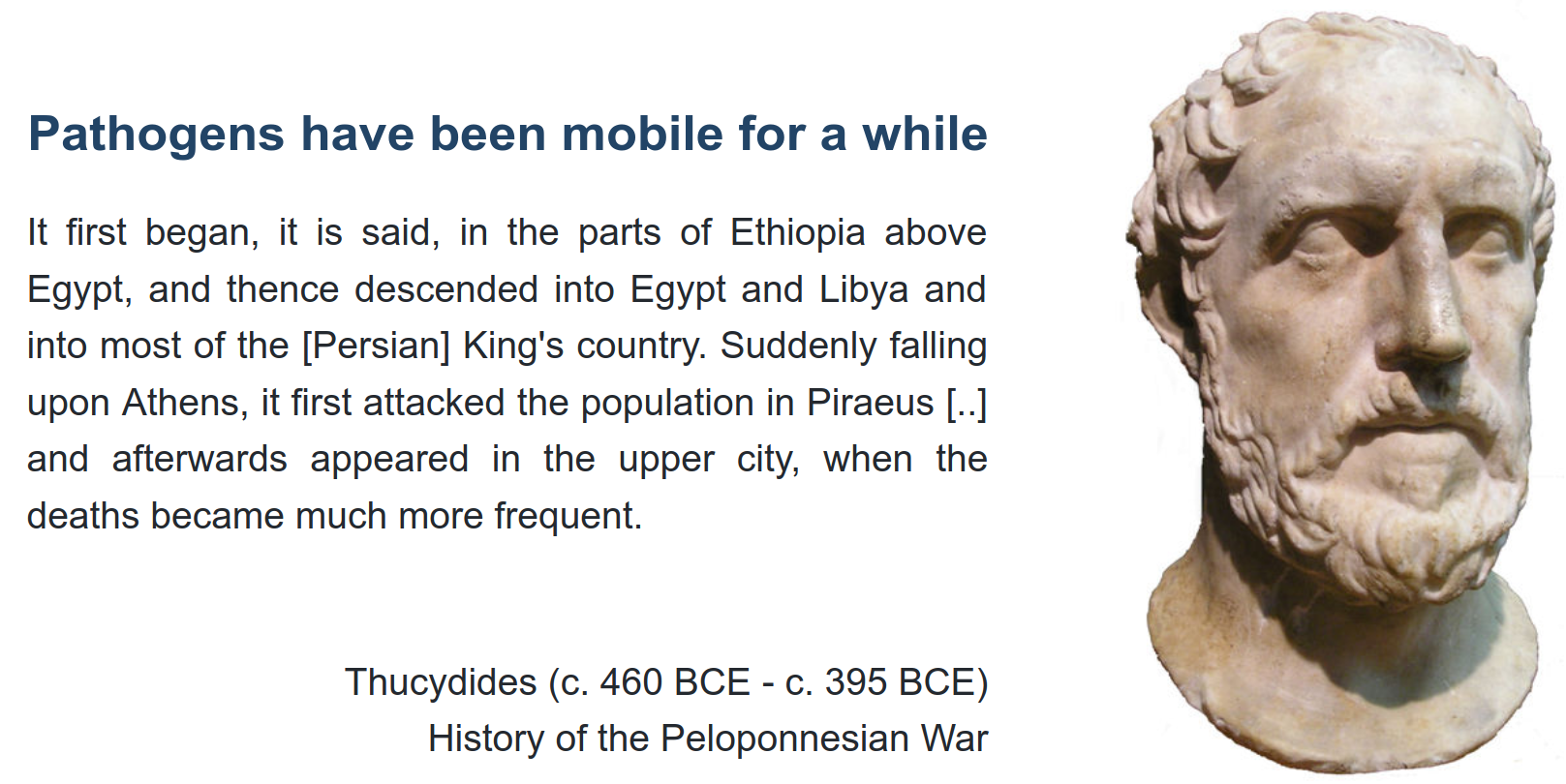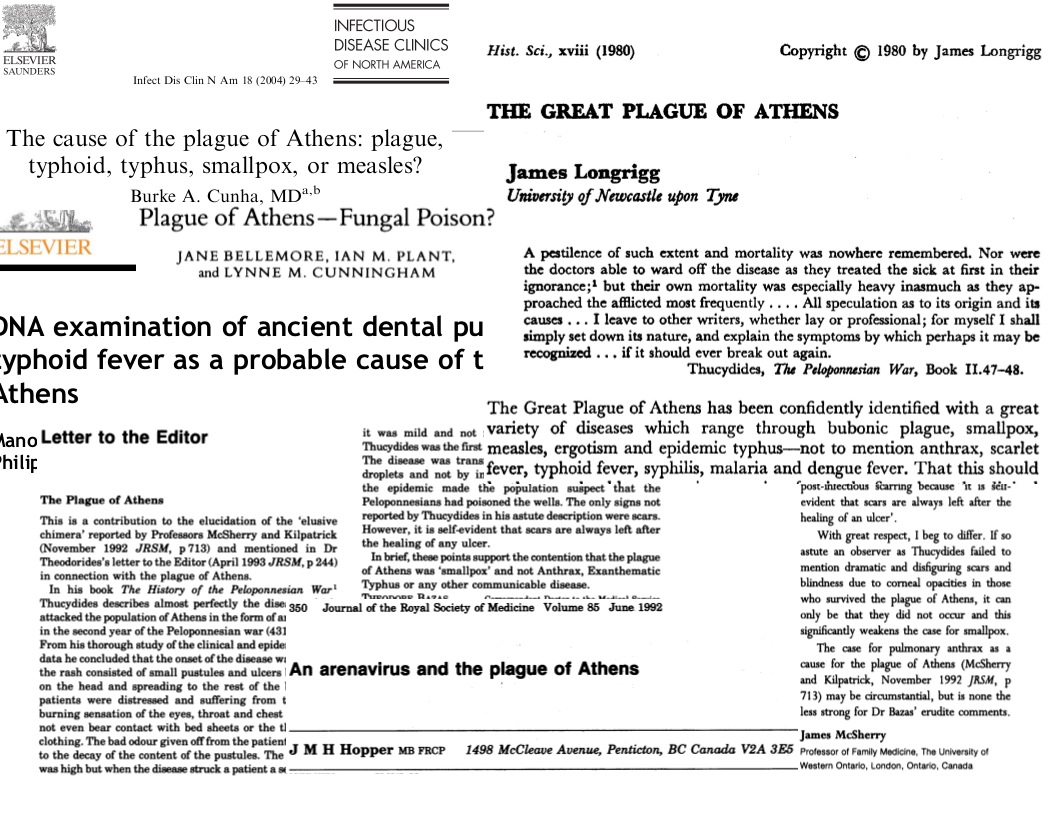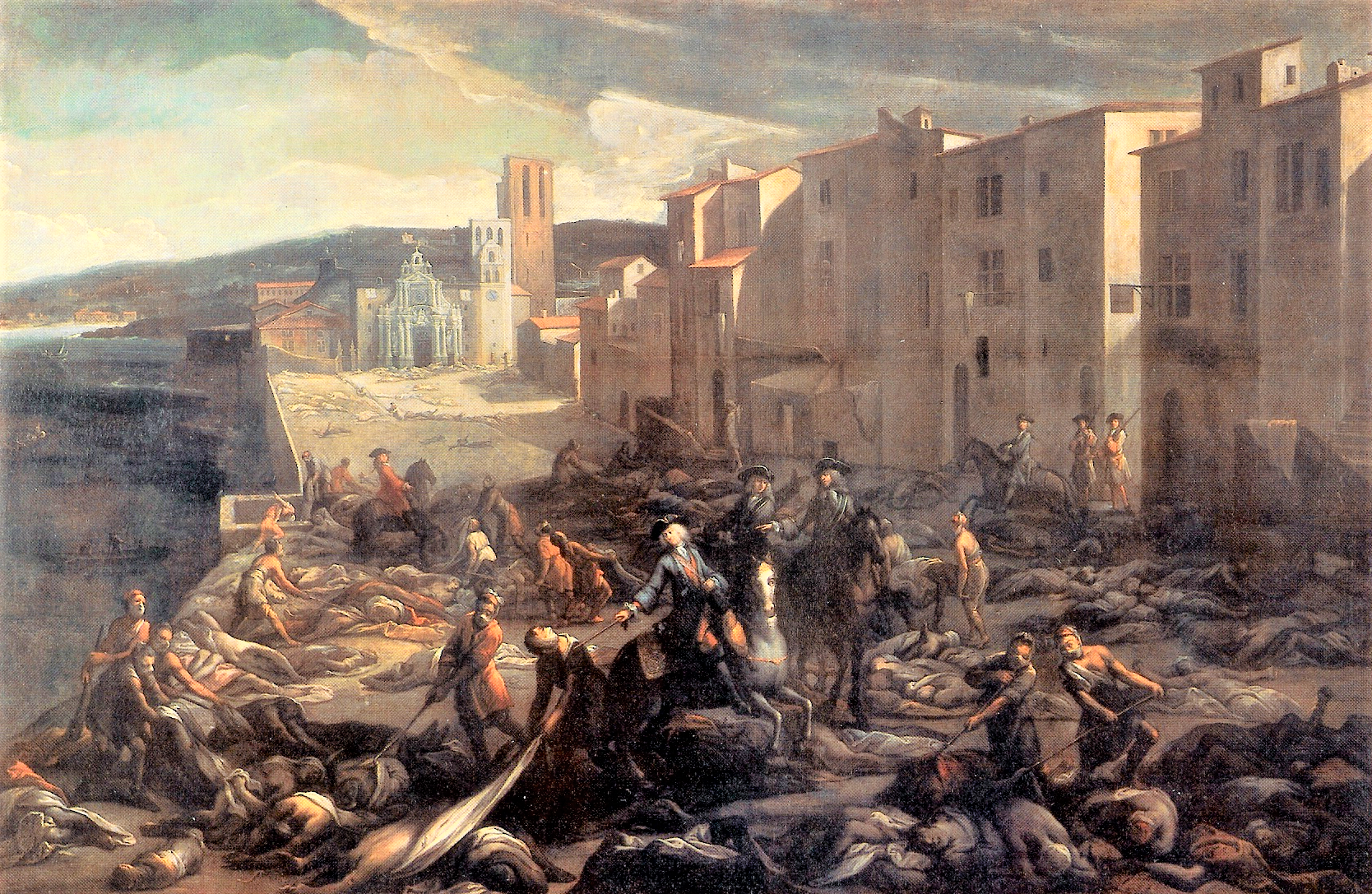Thucydides and epidemiology
Those who have suffered through one of my talks know that when discussing the spatial and temporal spread of infectious diseases (i.e., most of the time), I typically start by showing a slide similar to this:

I usually remark on the fact that this means the issue I am considering is not new and that almost two and a half millennia ago, Thucydides already gave a pretty “spatial” description of spread. I often advocate reading Thucydides. So I thought “why not make a blog post about this?”.. and here is said post.
Thucydides
Regarding Thucydides himself, let me be lazy and just point to the Wikipedia page about him. In (very) short, Thucydides was an Athenian who lived from circa 460 BCE to circa 400 BCE. His History of the Peloponnesian War is often considered as the first scholarly history book. The book gives an account of the Peloponnesian War (431–404 BCE) between the Peloponnesian League (led by Sparta) and the Delian League (led by Athens). Thucydides himself fought in that war, he was a General for Athens. For some reason, he fell out of love and was exiled; that is when he set on writing his History.
The plague of Athens
Of interest to me here is the part of the History of the Peloponnesian War that deals with the Plague of Athens, i.e., a few chapters in Book II (there are 8 books in the History of the Peloponnesian War). Concerning the History of the Peloponnesian War, the Wikipedia page provides a useful topical breakdown. The text itself is accessible on several servers. Here, I will use a version in the Perseus Digital Library. There are three versions in English and one in Greek there; I will be using this 1910 translation; earlier translation use less modern English.
However, let me start with a caveat. Here is another slide that I sometimes show.

This is a small sample of the medical literature on the topic. Clearly there is a good degree of uncertainty about the actual pathogen involved and everybody seems keen to claim it is their favourite pathogen that was involved. I will refer to the infection as plague, bearing in mind that it very likely is not.
Anyway, let us now turn to the text itself. Notes present in the text were removed. Most of the text is quoted, with [..] indicating removed text.
The plague is in Athens
There are a few references to the plague in Book I. However, the description proper starts in Book II, Chapter 47.
[..] Not many days after their [Lacedaemonians] arrival in Attica the plague first began to show itself among the Athenians. It was said that it had broken out in many places previously in the neighborhood of Lemnos and elsewhere; but a pestilence of such extent and mortality was nowhere remembered.
Note one very interesting passage:
Neither were the physicians at first of any service, ignorant as they were of the proper way to treat it, but they died themselves the most thickly, as they visited the sick most often [..]
This is still very much the case almost 2,500 years later. For instance, during the SARS crisis of 2003, 44% of cases in Toronto were health care workers (HCW); see this paper for instance. During the West Africa Ebola Virus Disease crisis of 2014-2016, 881 HCW were infected, of which 513 died; see here. Other things do not change as well:
Supplications in the temples, divinations, and so forth were found equally futile, till the overwhelming nature of the disaster at last put a stop to them altogether.
Spatio-temporal spread
The part in my slide is found in Chapter 48.
It first began, it is said, in the parts of Ethiopia above Egypt, and thence descended into Egypt and Libya and into most of the king’s country. Suddenly falling upon Athens, it first attacked the population in Piraeus,—which was the occasion of their saying that the Peloponnesians had poisoned the reservoirs, there being as yet no wells there—and afterwards appeared in the upper city, when the deaths became much more frequent.
The king’s country referred to is Persia. One part I edit for brevity in my introduction slide is the one concerning the poisoning of wells. Note an interesting remark to conclude this chapter:
All speculation as to its origin and its causes, if causes can be found adequate to produce so great a disturbance, I leave to other writers, whether lay or professional; for myself, I shall simply set down its nature, and explain the symptoms by which perhaps it may be recognized by the student, if it should ever break out again. This I can the better do, as I had the disease myself, and watched its operation in the case of others.
Thus Thucydides in fact was himself infected by the plague.
The symptoms
The next chapter (Chapter 49) describes symptoms. The relatively good yet generic description of these symptoms is probably the reason why so many hypotheses were formulated about the actual pathogen involved.
[..] As a rule, however, there was no ostensible cause; but people in good health were all of a sudden attacked by violent heats in the head, and redness and inflammation in the eyes, the inward parts, such as the throat or tongue, becoming bloody and emitting an unnatural and fetid breath. These symptoms were followed by sneezing and hoarseness, after which the pain soon reached the chest, and produced a hard cough. When it fixed in the stomach, it upset it; and discharges of bile of every kind named by physicians ensued, accompanied by very great distress. In most cases also an ineffectual retching followed, producing violent spasms, which in some cases ceased soon after, in others much later. Externally the body was not very hot to the touch, nor pale in its appearance, but reddish, livid, and breaking out into small pustules and ulcers. But internally it burned so that the patient could not bear to have on him clothing or linen even of the very lightest description; or indeed to be otherwise than stark naked. What they would have liked best would have been to throw themselves into cold water; as indeed was done by some of the neglected sick, who plunged into the rain-tanks in their agonies of unquenchable thirst; though it made no difference whether they drank little or much. Besides this, the miserable feeling of not being able to rest or sleep never ceased to torment them. The body meanwhile did not waste away so long as the distemper was at its height, but held out to a marvel against its ravages; so that when they succumbed, as in most cases, on the seventh or eighth day to the internal inflammation, they had still some strength in them. But if they passed this stage, and the disease descended further into the bowels, inducing a violent ulceration there accompanied by severe diarrhea, this brought on a weakness which was generally fatal. For the disorder first settled in the head, ran its course from thence through the whole of the body, and even where it did not prove mortal, it still left its mark on the extremities; for it settled in the privy parts, the fingers and the toes, and many escaped with the loss of these, some too with that of their eyes. Others again were seized with an entire loss of memory on their first recovery, and did not know either themselves or their friends.
In Chapter 50, Thucydides seems to indicate that there was human to bird transmission.
But while the nature of the distemper was such as to baffle all description, and its attacks almost too grievous for human nature to endure, it was still in the following circumstance that its difference from all ordinary disorders was most clearly shown. All the birds and beasts that prey upon human bodies, either abstained from touching them (though there were many lying unburied), or died after tasting them. In proof of this, it was noticed that birds of this kind actually disappeared; they were not about the bodies, or indeed to be seen at all. But of course the effects which I have mentioned could best be studied in a domestic animal like the dog.
Moving on to Chapter 51:
Such then, if we pass over the varieties of particular cases, which were many and peculiar, were the general features of the distemper. Meanwhile the town enjoyed an immunity from all the ordinary disorders; or if any case occurred, it ended in this. Some died in neglect, others in the midst of every attention. No remedy was found that could be used as a specific; for what did good in one case, did harm in another. Strong and weak constitutions proved equally incapable of resistance, all alike being swept away, although dieted with the utmost precaution. By far the most terrible feature in the malady was the dejection which ensued when anyone felt himself sickening, for the despair into which they instantly fell took away their power of resistance, and left them a much easier prey to the disorder; besides which, there was the awful spectacle of men dying like sheep, through having caught the infection in nursing each other. This caused the greatest mortality. On the one hand, if they were afraid to visit each other, they perished from neglect; indeed many houses were emptied of their inmates for want of a nurse: on the other, if they ventured to do so, death was the consequence. This was especially the case with such as made any pretensions to goodness: honor made them unsparing of themselves in their attendance in their friends’ houses, where even the members of the family were at last worn out by the moans of the dying, and succumbed to the force of the disaster.
Some temporary immunity seemed to arise and was noticed.
Yet it was with those who had recovered from the disease that the sick and the dying found most compassion. These knew what it was from experience, and had now no fear for themselves; for the same man was never attacked twice—never at least fatally.
As with many things in that era, proper observations and conclusions were extrapolated perhaps a little too much. [Edit in 2022: Although it should noted that during COVID-19, some individuals used this reasoning.]
And such persons not only received the congratulations of others, but themselves also, in the elation of the moment, half entertained the vain hope that they were for the future safe from any disease whatsoever.
Going spatio-temporal again
Chapter 52 again raises issues related to problems of interest to me.
An aggravation of the existing calamity was the influx from the country into the city, and this was especially felt by the new arrivals. As there were no houses to receive them, they had to be lodged at the hot season of the year in stifling cabins, where the mortality raged without restraint.
And now things go bad..
Still in Chapter 52, we move on to the problem of dealing with extraordinary mortality.
The bodies of dying men lay one upon another, and half-dead creatures reeled about the streets and gathered round all the fountains in their longing for water. The sacred places also in which they had quartered themselves were full of corpses of persons that had died there, just as they were; for as the disaster passed all bounds, men, not knowing what was to become of them, became utterly careless of everything, whether sacred or profane. All the burial rites before in use were entirely upset, and they buried the bodies as best they could. Many from want of the proper appliances, through so many of their friends having died already, had recourse to the most shameless sepultures: sometimes getting the start of those who had raised a pile, they threw their own dead body upon the stranger’s pyre and ignited it; sometimes they tossed the corpse which they were carrying on the top of another that was burning, and so went off.
This is reminiscent of paintings by Michel Serre describing the situation during the 1720 plague of Marseille.

Interestingly, during the 2014-2016 West Africa EVD epidemic, it is the non-breakdown of local funeral rites that was dangerous, since people were interacting with bodies that were still infectious. Funeral rites were not the only victims of the plague. As evidenced by Chapter 53, there was a sense of gloom and doom that led people to modify their behaviour.
Nor was this the only form of lawless extravagance which owed its origin to the plague. Men now coolly ventured on what they had formerly done in a corner, and not just as they pleased, seeing the rapid transitions produced by persons in prosperity suddenly dying and those who before had nothing succeeding to their property. So they resolved to spend quickly and enjoy themselves, regarding their lives and riches as alike things of a day. Perseverance in what men called honor was popular with none, it was so uncertain whether they would be spared to attain the object; but it was settled that present enjoyment, and all that contributed to it, was both honorable and useful. Fear of gods or law of man there was none to restrain them. As for the first, they judged it to be just the same whether they worshiped them or not, as they saw all alike perishing; and for the last, no one expected to live to be brought to trial for his offenses, but each felt that a far severer sentence had been already passed upon them all and hung ever over their heads, and before this fell it was only reasonable to enjoy life a little.
This was seen again during the Plagues of the Middle Ages. Finally, Chapter 54 concludes the account of the plague. First, some considerations that date the text.
Such was the nature of the calamity, and heavily did it weigh on the Athenians; death raging within the city and devastation without. Among other things which they remembered in their distress was, very naturally, the following verse which the old men said had long ago been uttered:
“ A Dorian war shall come and with it death.”
So a dispute arose as to whether dearth and not death had not been the word in the verse; but at the present juncture, it was of course decided in favor of the latter; for the people made their recollection fit in with their sufferings. I fancy, however, that if another Dorian war should ever afterwards come upon us, and a dearth should happen to accompany it, the verse will probably be read accordingly. The oracle also which had been given to the Lacedaemonians was now remembered by those who knew of it. When the God was asked whether they should go to war, he answered that if they put their might into it, victory would be theirs, and that he would himself be with them. With this oracle events were supposed to tally. For the plague broke out so soon as the Peloponnesians invaded Attica, and never entering Peloponnese (not at least to an extent worth noticing), committed its worst ravages at Athens, and next to Athens, at the most populous of the other towns.
Thucydides and his contemporaries can probably be excused: medical knowledge at the time was quite rudimentary, so why not involve oracles? And in their defence, people were not much more rational during the Great Plagues of the middle to late Middle Age in Europe. Finally, Thucydides concludes with a somewhat ominous and definitive:
Such was the history of the plague.
Enjoy Reading This Article?
Here are some more articles you might like to read next: